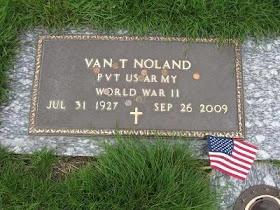When
you are visiting some cemeteries, especially National Cemeteries, you may
notice that some headstones marking some of the graves have coins on them, left
by previous visitors to the grave. Well, here is a purported story, and I think
it's a good one!
These coins have distinct meanings when left on the headstones of those who gave their life while serving in America's military, and these meanings vary depending on the denomination of coin.
A coin left on a headstone or at the grave site is meant as a message to the deceased soldier's family that someone else has visited the grave to pay respect.
These coins have distinct meanings when left on the headstones of those who gave their life while serving in America's military, and these meanings vary depending on the denomination of coin.
A coin left on a headstone or at the grave site is meant as a message to the deceased soldier's family that someone else has visited the grave to pay respect.
Leaving a penny at the grave means
simply that you visited.
A nickel indicates that you and the deceased trained at boot camp together.
A nickel indicates that you and the deceased trained at boot camp together.
A dime means you served with him in some
capacity.
A quarter left at the grave tells the
family that you were with the solider when he was killed.
According to tradition, the money left at graves in national cemeteries and state veterans cemeteries is eventually collected, and the funds are put toward maintaining the cemetery, or for paying burial costs for indigent veterans.
In the US, this practice became common during the Vietnam War, due to the political divide in the country over the war; leaving a coin was seen as a more practical way to communicate that you had visited the grave. It was thought this better than contacting the soldier's family, which could devolve into an uncomfortable argument over politics relating to the war.
Some Vietnam Veterans would leave coins as a "down payment" to buy their fallen comrades a beer or play a hand of cards when they would finally be reunited.
The tradition of leaving coins on the headstones of military men and women can be traced to as far back as the Roman Empire.
According to tradition, the money left at graves in national cemeteries and state veterans cemeteries is eventually collected, and the funds are put toward maintaining the cemetery, or for paying burial costs for indigent veterans.
In the US, this practice became common during the Vietnam War, due to the political divide in the country over the war; leaving a coin was seen as a more practical way to communicate that you had visited the grave. It was thought this better than contacting the soldier's family, which could devolve into an uncomfortable argument over politics relating to the war.
Some Vietnam Veterans would leave coins as a "down payment" to buy their fallen comrades a beer or play a hand of cards when they would finally be reunited.
The tradition of leaving coins on the headstones of military men and women can be traced to as far back as the Roman Empire.
I did not know of this, but you can bet
your dog tags that I will have a pocket full of coins the next time I visit my
friends.
Thanks, guys! And RIP!


I had no clue!
ReplyDeleteNow I will know.
My brother died of cancer as a result of Agent Orange from the Vietnam War.
I miss him so much.
Yep, seen it at the Wall too...
ReplyDeleteI had no idea! I've never seen coins on a military headstone, but if I ever see one again, it will have my pennies.
ReplyDeleteNow i know what to do with that jat of pennies i got on the back of my dressor.
ReplyDeleteThank you.
Wow, this is news to me. I will remember to bring some change next time I visit a cemetery. Thanks. . .
ReplyDeleteAt Erieview Cemetery, in Cleveland, Ohio, I have seen this on the grave of, of all people, John D. Rockefeller.
ReplyDeleteThere will be nickles, mostly dimes, and some quarters on the headstone. He's been gone a very long time, so it must have some other meanings as well.
That's a pretty cool bit of trivia ~ thanks for sharing it!
ReplyDelete+1 lotta joy and Miss Em.
ReplyDeleteI had no idea. I've never seen coins on a grave, but I was never looking for them either. At The Wall I usually see flowers and sometimes combat boots.
ReplyDeleteLove,
Janie